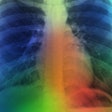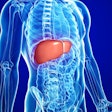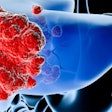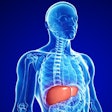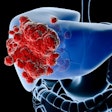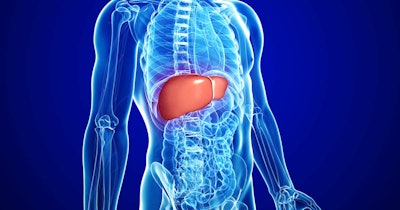
An artificial intelligence-based blood testing technology developed and used by Johns Hopkins Kimmel Cancer Center researchers to detect lung cancer in a 2021 study detected more than 80% of liver cancers in a new study.
The blood test, called DELFI (DNA evaluation of fragments for early interception), detects changes in cell-free DNA (cfDNA) -- specifically, in DNA from cancer cells shed into the bloodstream.
In the most recent study, investigators used DELFI technology on blood plasma samples obtained from 724 individuals in the U.S., the European Union (EU), and Hong Kong to detect a type of liver cancer called hepatocellular cancer (HCC).
They reported the findings on Friday in Cancer Discovery and at the American Association for Cancer Research Special Conference: Precision Prevention, Early Detection, and Interception of Cancer in Austin, TX.
The DELFI technology detected liver cancers at their earliest stages, with an overall sensitivity of 88% and a specificity of 98%. In samples collected from those at high risk of HCC, the test had 85% sensitivity and 80% specificity, the researchers said.
“There is great interest from us and from researchers around the world in bringing more sensitive, affordable liver cancer screening blood tests to the clinic,” Dr. Victor Velculescu, professor of oncology and codirector of the Cancer Genetics and Epigenetics Program at the Johns Hopkins Kimmel Cancer Center, said in an interview.
Velculescu co-led the study with Dr. Zachariah Foda, gastroenterology fellow, Dr. Akshaya Annapragada, a PhD student, and Dr. Amy Kim, an assistant professor of medicine at the Johns Hopkins University School of Medicine.
Their next steps include validating this approach in larger studies for clinical use -- something that the researchers are “actively pursuing,” said Velculescu, who is a cofounder of Delfi Diagnostics and an adviser to Danaher, Takeda Pharmaceuticals, and Viron Therapeutics.
For Delfi Diagnostics, the study represents “promising early data in liver cancer, which is a cancer type with a significant unmet medical need and where there is potential clinical utility for a test based on the DELFI platform,” Velculescu said. “Delfi views this study as a strong proof of concept of the platform’s utility beyond lung cancer, where it is planning to introduce a commercial screening test in 2023. It’s too early to say when a liver test could be commercially available, but it is something that Delfi is evaluating."
It's also too early to say what the regulatory path for a liver cancer test might be. However, Delfi Diagnostics is planning to introduce the lung cancer test based on this platform as a laboratory-developed test in 2023 and is simultaneously conducting a prospective 15,000 patient trial that would support an application for clearance or approval to the U.S. Food and Drug Administration.
In July, the firm announced it had raised $225 million in a Series B financing round. The funds will support continued development and commercialization of its liquid biopsy tests for single-cancer early detection, multicancer early detection, and treatment monitoring, the firm said. In 2021, it raised $100 million in a Series A financing round.
Cell-free DNA technology
According to Johns Hopkins, DELFI technology used in the new study leverages a blood test to measure the way DNA is packaged inside the nucleus of a cell by studying the size and amount of cfDNA present in the circulation from different regions across the genome. When cancer cells die, they release DNA fragments in a chaotic manner into the bloodstream.
DELFI identifies the presence of cancer by examining millions of the cfDNA fragments for abnormal patterns, including the size and amount of DNA in different genomic regions. The DELFI approach requires low-coverage sequencing, enabling this technology to be cost-effective in a screening setting, the researchers said.
They added that this may be the first genome-wide fragmentation analysis independently validated in two high-risk populations and across different racial and ethnic groups with different causes associated with their liver cancers.
Of the 724 plasma samples studied, investigators collected 501 in the U.S. and EU and included samples from 75 people with HCC to train and validate the machine-learning model.
The model uses data and algorithms to improve testing accuracy.
For validation, an additional 223 plasma samples were analyzed from individuals in Hong Kong and included samples from 90 people with HCC, 66 with hepatitis B virus (HBV), 35 with HBV-related liver cirrhosis, and 32 people with no underlying risk factors.
The researchers performed the test on cfDNA fragments isolated from the plasma samples and analyzed the patterns of fragmentation across each sample to develop a DELFI score.
Scores were low for cancer-free individuals with viral hepatitis or cirrhosis (median DELFI scores were 0.078 and 0.080, respectively), but, on average, five to 10 times higher for the 75 HCC patients in the U.S./EU samples, with high scores observed across all cancer stages, including early-stage disease (DELFI scores for Stage 0 = 0.46, Stage A = 0.61, Stage B = 0.83, and Stage C = 0.92).
In addition, the test detected fragmentation changes in the content and packaging of liver cancer genomes, including from genome regions associated with liver-specific activity, the researchers said.
HCC prevalence
Johns Hopkins noted that an estimated 400 million people worldwide are at higher risk of developing HCC because of cirrhosis from chronic liver diseases including chronic viral hepatitis or non-alcoholic fatty liver disease. More than 800,000 people are diagnosed with liver cancer worldwide each year, and it is a leading cause of cancer deaths worldwide, according to the American Cancer Society.
The standard of care for liver cancer screening is ultrasound and blood-based alpha-fetoprotein (AFT) tumor marker testing. “The sensitivity of these for cancer is limited,” Velculescu said. “Unfortunately, at diagnosis, less than half of all liver cancer cases are localized. In those cases, five-year survival is 34%, and just 12% when regional and 3% when distant. We see a need for a highly sensitive, affordable, and accessible form of early detection.”
According to Kim, less than 20% of the high-risk population is screened for liver cancer because of accessibility and suboptimal test performance. “This new blood test can double the number of liver cancer cases detected, compared to the standard blood test available, and increase early cancer detection,” Kim added.








